Table of Contents
- 5+ Client Onboarding Questionnaire Templates in PDF | MS Word
- 1. Client Virtual Onboarding Questionnaire
- 2. Client Onboarding Primary Questionnaire
- 3. Client Management Onboarding Questionnaire
- 4. Client Onboarding Satisfaction Questionnaire
- 5. Client Deliverable Onboarding Questionnaire
- How is the Client Onboarding Process Carried Out?
- What Type of Questions Can You Add?
- What is the Client Onboarding Process?
- Why is it Important?
- Conclusion
5+ Client Onboarding Questionnaire Templates in PDF | MS Word
A set of questions that are used after the client onboarding process where new clients are brought into a business or a company or organization is known as a client onboarding questionnaire. It is considered to be an opportunity to build a relationship, address various concerns, and also get the client up to speed. The questions mentioned in this client onboarding questionnaire helps you get to know your client and also familiarize yourself with their goals.

5+ Client Onboarding Questionnaire Templates in PDF | MS Word
1. Client Virtual Onboarding Questionnaire
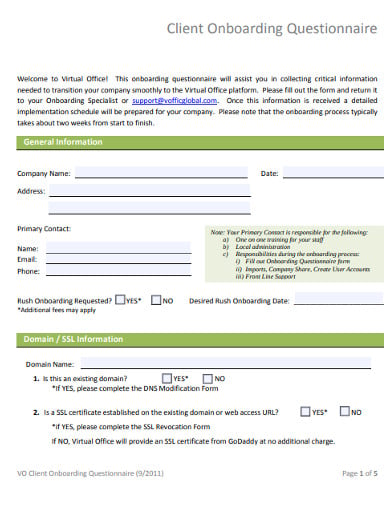 vofficeglobal.com
vofficeglobal.com2. Client Onboarding Primary Questionnaire
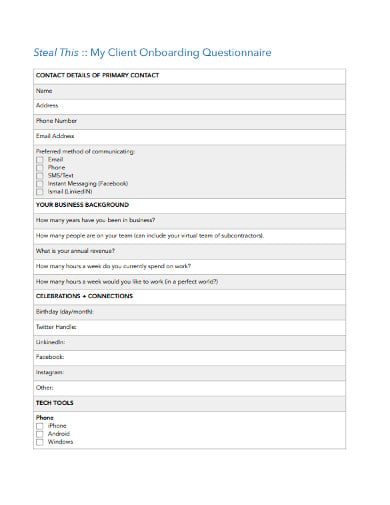 builttosoar.com
builttosoar.com3. Client Management Onboarding Questionnaire
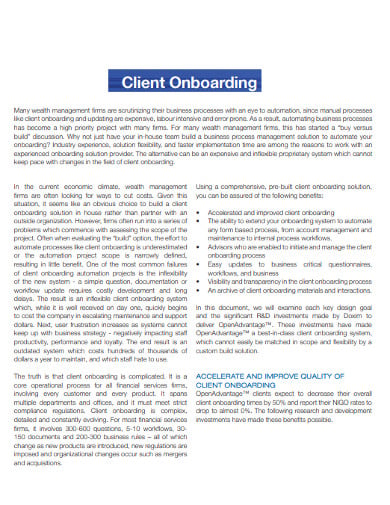 doxim.com
doxim.com4. Client Onboarding Satisfaction Questionnaire
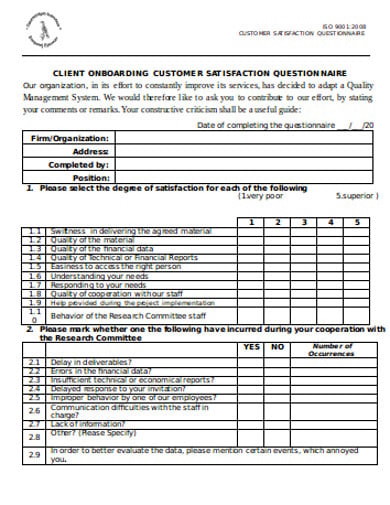 rc.uoi.gr
rc.uoi.gr5. Client Deliverable Onboarding Questionnaire
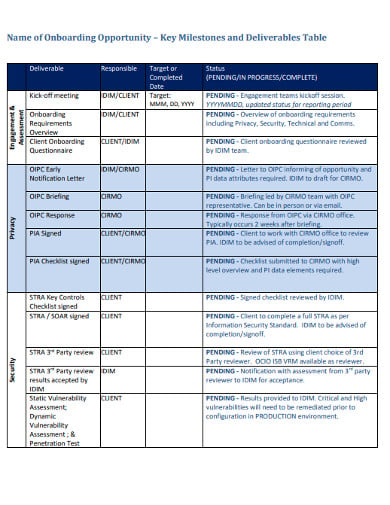 gov.bc.ca
gov.bc.caHow is the Client Onboarding Process Carried Out?
Step 1: Let the Client Settle
Before carrying on with your client onboarding, you must legally establish the client with your company. In simple words, this means that you must write a proposal for the project, build a contract as well as set up a payment for your work. This first step is important because it helps in ensuring that the client is bound to your agreement and that you are not doing work for free.
Step 2: Determine Your Client’s Goals
You must always have your clients directly explain their goals even though you already have an idea of what the client hopes to accomplish. This is where a client onboarding questionnaire comes in that will ask the customers all those questions that you have about the project. With the help of this questionnaire, you will be able to turn your client’s answers into actionable team goals.
Step 3: Plan a Meeting
After the plan is laid out, it is time for the meeting and this can be your chance to introduce your client to the team. This meeting can make everyone excited about the project. The meeting will help in setting a confident tone by making it clear to the client that they put their trust in the right team. You can also state the business goals, timeline, lead contact, and step-by-step responsibilities through this meeting to prove to your client that you are prepared and ready to go.
Step 4: Officially Welcoming the Client
After completing the meeting, you should formally welcome the client to your business. You can do that by sending a welcome package along with a personalized note or a video, and it can even be a branded merchandise. Besides that, you must provide any other important documents as well as certain information that the client may need for moving forward.
Step 5: Organize a Check-in Call after a Month
After a month, your team must check-in with your client and by this time, your plan has been properly tested and your client will have a good feeling regarding your team’s progress. You can use this time to give your client feedback regarding how the onboarding process is going on and also ask about any additional questions, etc. You must take this call seriously as the more genuine you are about hearing and responding, the less likely they are to stir.
What Type of Questions Can You Add?
-
Basic Information
This includes basic contact or personal information of the client. Questions like who is the main point of contact at your business and what is their contact information are commonly asked. Also, the business address, website URL, if there are any, can be asked in the questionnaire. You can also ask if there are any documents about the business that can be read and can be kept on-hand. And if there are any, then ask them to attach them here.
-
Marketing Information
Questions related to marketing can also be asked as in a client onboarding questionnaire. Questions like what are the goals and vision of the brand and who are the main competitors can also be asked. Questions regarding the target audience are also asked.
-
Project Information
Your questionnaire may also contain questions related to the project-specific information and ask about the overarching goals for a particular project. You can also add questions like what are the specific metrics that can be used to measure the success of a project. Questions related to the deadline for the project as well as questions related to the budget of this project can also be asked.
-
Business Information
You can also ask about how the client heard about your business or why did they select your business for this particular project. You can also ask what more can your team do to ensure that this is a smooth, satisfactory process for you.
What is the Client Onboarding Process?
The client onboarding process can be considered as a perfect opportunity to leave a positive first impression on the clients. This particular process is filled with various promises and if you handle it like a pro, then you will be able to set the foundations for a productive and lasting relationship. It is usually a process of welcoming a new client, establishing the specific ways that you will work together, and create the foundations for success.
Why is it Important?
A proper client onboarding process is important because it can help you in improving the retention rates for the new clients as well as ensure compliance with legal obligations. It also provides aid in making your clients happy and comfortable and also creates a healthy atmosphere to work with your client more efficiently. It is also referred to as an important opportunity for you to make a positive first impression. Besides, it also helps in demonstrating the smoothness and productivity of your relationship.
Conclusion
Lastly, it can be said that the client onboarding process can take some trial and error to make it perfect whereas few businesses may get it exactly right for the first time itself. You can keep developing your client onboarding process and figure out what works and what does not work with the project. You or your team must stay positive and keep trying different things until you find what works for your business. Ensure that you are constantly improving this process for your clients and keep their needs first.

